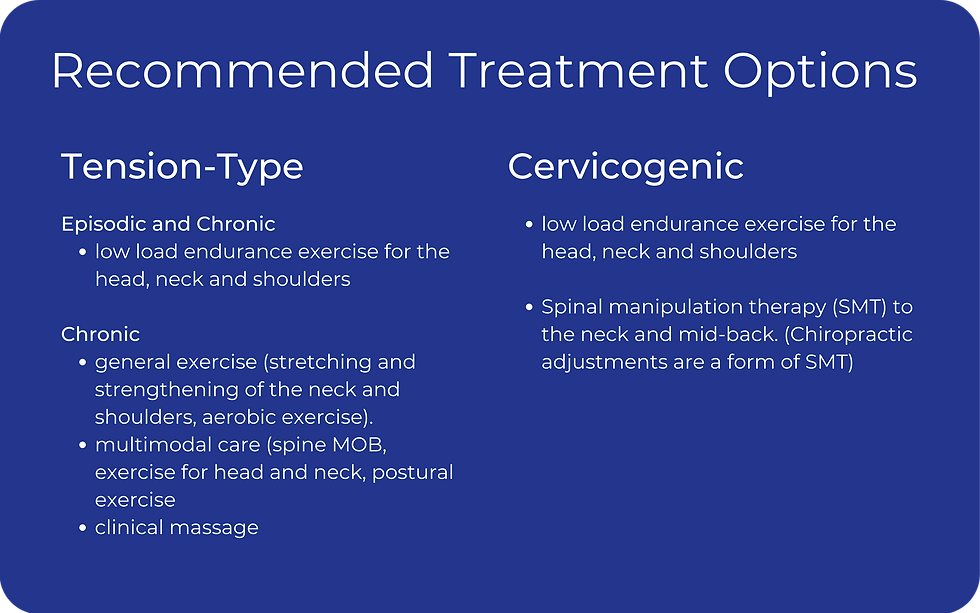Headaches Related to Neck Pain
- Dr. Stefano Bozzo
- Jul 20, 2021
- 2 min read
Updated: Mar 2, 2022
Neck pain and headache commonly occur together. For example, those suffering from disabling neck pain are ten times more likely to suffer from related headaches than those without neck pain. Furthermore, 80% of those experiencing headaches after a motor vehicle accident also experience neck pain.
There are many headache types, but only tension-type and cervicogenic headaches have a suggested link to the neck (ICHD-3).
Tension-Type Headache

Tension-type headaches are common and have an estimated lifetime prevalence of 30-78%. That means that up to 78% of people report at least one episode in their life. Although the exact mechanisms are not known, tenderness in the muscles around the head and neck (pericranial tenderness) is the most significant finding but does not always occur. Tension-type headaches can be episodic or chronic.
Characteristics of Tension-Type Headache
Episodic are those with 10+ episodes occurring on 14 or less a month.
Chronic are those with episodes occurring on 15 or more days a month.
Often on both sides, “Band-like” pain
Pressing or tightening quality
Non-pulsating
Mild or moderate-intensity
Lasting 30min - 7 days
Not worse with exercise
Sensitivity to light OR to sound (photo/phonophobia) may be present
May have nausea
No vomiting
Cervicogenic Headache
Cervicogenic headaches are caused by disorders of the neck structures. Neck pain is usually present but not always.
Characteristics of Cervicogenic Headaches
Headache with neck pain and limited range of motion
One or both sides of the head (uni/bilateral)
Beginning at the back of the head and migrating forward
Worse with sustained postures
Headache improves as the neck pain improves

What to expect when seeing a healthcare provider
If you believe you are suffering headaches related to neck pain, a local chiropractor can help. The first step is to rule out other structural pathology or migraine as the cause. Initially, you should be offered advice to stay active along with information about your headache and a proposed course of management. Recommended treatment options will depend on the type of headache. You and your healthcare provider should discuss care options and decide together which are best for you.

If you think you or someone you know are suffering with headache related to neck pain, and are wondering if chiropractic care can help. Please email me, I am happy to answer your questions.
This article is for information purposes only. If you are experiencing pain, consult a health care professional, such as a chiropractor who will assess your needs and identify a course of action that’s right for your specific condition.
References:
Côté P, Yu H, Shearer HM, et al. Non‐pharmacological management of persistent headaches associated with neck pain: A clinical practice guideline from the Ontario protocol for traffic injury management (OPTIMa) collaboration. Eur J Pain. 2019;23:1051–1070. https://doi.org/10.1002/ejp.1374
International Headache Society. (n.d.-a). 2. Tension-type headache (TTH). ICHD-3 The International Classification of Headache Disorders 3rd Edition. Retrieved February 27, 2021, from https://ichd-3.org/2-tension-type-headache/
International Headache Society. (n.d.-b). 11.2.1 Cervicogenic headache. ICHD-3 The International Classification of Headache Disorders 3rd Edition. Retrieved February 27, 2021, from https://ichd-3.org/11-headache-or-facial-pain-attributed-to-disorder-of-the-cranium-neck-eyes-ears-nose-sinuses-teeth-mouth-or-other-facial-or-cervical-structure/11-2-headache-attributed-to-disorder-of-the-neck/11-2-1-cervicogenic-headache/




Comments